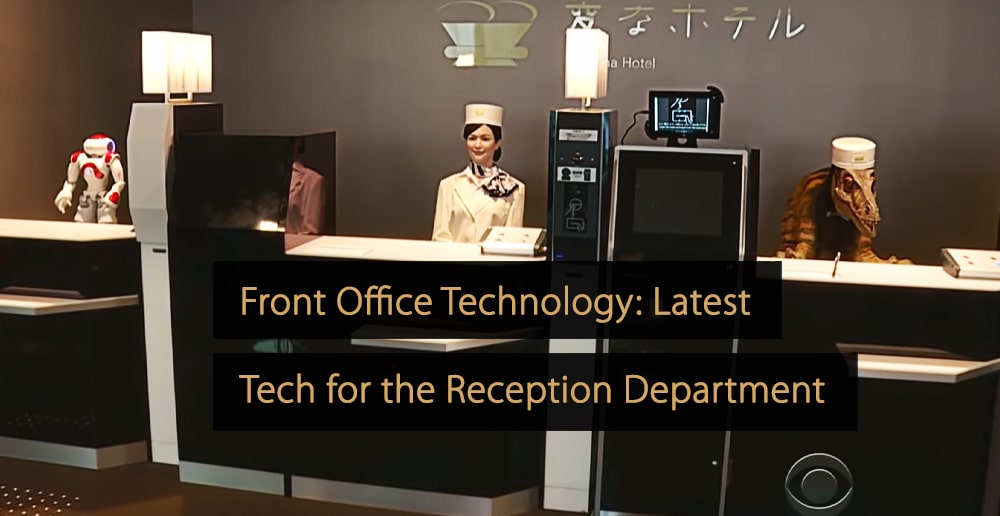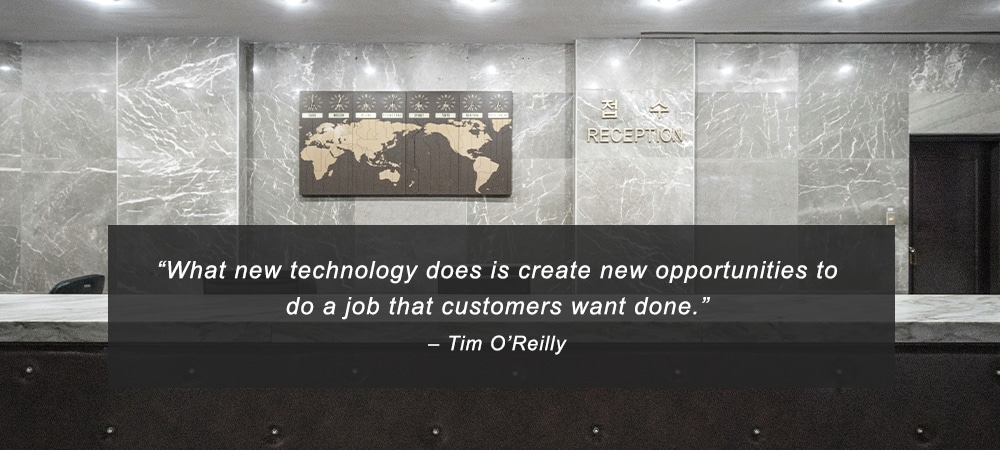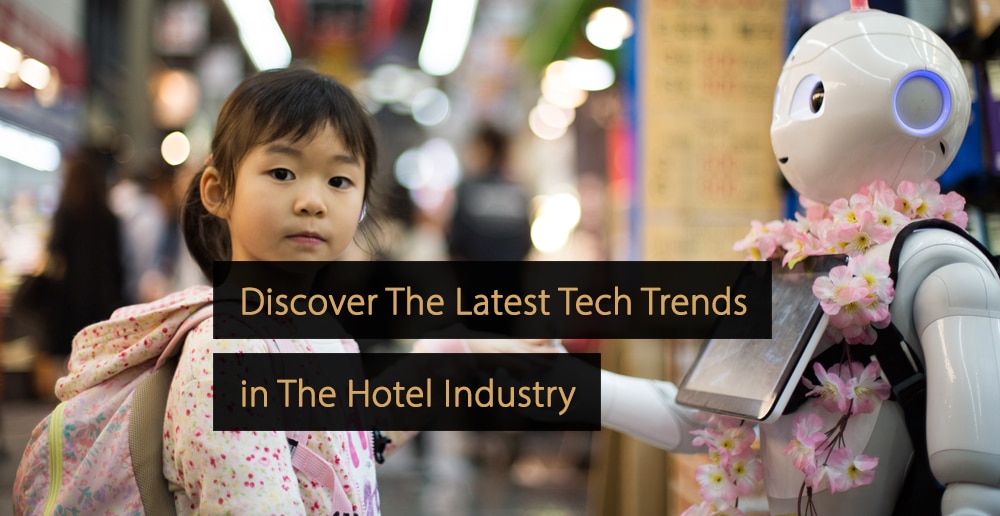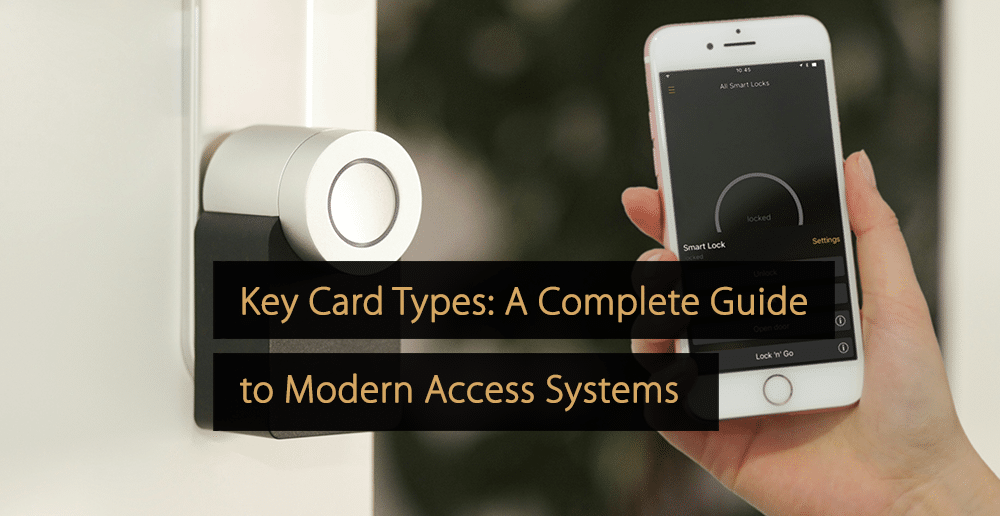Front office technology has seen significant development in recent years. Driven in part by the rise of COVID-19 and technological changes, these changes mean that today’s front desk is different from the traditional reception office of the past. In this article, you’ll learn about exciting developments in front-office technology and what they mean for your business.
Table of Contents:
- What Is the Hotel Industry?
- What Is Front Office Technology?
- Why Is It Important to Follow Front Office Technology Trends?
- 8 Front Office Technology Trends You Should Know About
- Uncovering Hotel Housekeeping Technology
- Smart Hotel Technology Innovations
- Mobile Check-in Apps As Part of Front Office Technology
What Is the Hotel Industry?
The hotel industry is a major part of the wider service industry sector. The industry looks after customers’ needs that must be accommodated overnight or longer. Although the hotel industry is closely linked to the wider hospitality and service industries, there are significant differences in scope between them regarding what they set out to provide.
In “Hotel Industry: Everything You Need to Know About Hotels!”, you’ll learn about the similarities and differences between the hospitality, service, and hotel industries, the different types of accommodation offered by the hotel industry, and different hotel positions. You’ll also learn about hotel management and gain important information about careers and business opportunities in this important sector.
What Is Front Office Technology?
Front Office Technology has seen significant development in recent years. The front office is a major department in any hotel, forming the main point of contact between the business and its customers. The front office has been termed the “face” of the hotel, and for a good reason: it’s usually the first department that any guest will come into contact with and the point at which they will form their first impressions. Front office technology, therefore, is hugely important. Any technological advance or development that can improve a customer’s experience and make life easier for busy staff will make a major difference to a hotel. In this article, you’ll learn about the latest developments in front-office technology and how they can benefit your hotel.
You’ll learn how front desk technology can save money, save time, make your guests happier, and let your staff focus on the most important tasks. You’ll learn about the benefits of new technology and how you can implement it. You’ll learn everything from mobile phone apps, smart assistants, digital keys, and virtual concierges. As front desk technology changes, staying up to date is important. If you don’t adopt the latest tech to improve your front desk, you can be sure that your competitors will. Read on to find out everything you need to know about front-office technology.
Why Is It Important to Follow Front Office Technology Trends?
Following front-office technology trends is vital to providing a quality customer experience and remaining competitive in today’s marketplace. While fears are sometimes expressed that new technologies will eclipse humans in the industry, this is a misconception. New front office technologies can free up human staff to handle time-consuming tasks so that hotel personnel have more time to care for customers’ needs.
For example, staff may need to be away from the front desk occasionally. A smartphone app allows them to be present when a customer needs their assistance. There’s far more to the front office than simply checking in guests. Automating basic processes means that staff has more freedom to attend to guests and make their stay more pleasant instead of having to devote time to rote tasks better handled by automated systems.
Table: Benefits & Risks of the Importance of Hotel Front Office Technology
8 Front Office Technology Trends You Should Know About
Hotel owners and managers should know some key front-office technology trends.
1. AI and Hotel Chatbots
Chatbots are a common feature of daily life, from virtual assistants to AI language teachers. Many websites offer chatbots to help visitors find what they need. Modern AI has come a long way since the days of Eliza and similar relatively simple programs, with chatbots offering an increasingly sophisticated and human-like experience. Integrating AI chatbots into your hotel’s customer service can streamline communications, helping you provide quality service regardless of staff availability. In fact, according to Global AI in Hospitality Market Report, AI use in Hospitality is projected to grow by 11.87 % Compound Annual Growth Rate (CAGR) in the upcoming period of 2023-2031.
Chatbots can handle guest inquiries, provide information, solve problems, and generally make a guest’s stay more pleasant. Because voice recognition is now so advanced, guests can talk to an AI naturally. As many people nowadays are used to using Alexa, Siri, and similar technologies, chatbots are no longer daunting or confusing. Customers who normally prefer to interact with human staff can be comfortable using an AI chatbot to handle their requests.
Video: Chatbot for hotels
2. ChatGPT Usage
In addition to hotel chatbots, AI technology like ChatGPT is increasingly used as a form of front office technology. ChatGPT is a free-to-access AI system and chatbot that can also be used to create content through the provision of prompts. For instance, you could enter prompts to guide ChatGPT to generate an email about a specific topic.
Read “ChatGPT Hotel Guide: Learn How Hotels Can Benefit from ChatGPT!“ to find out much more about how ChatGPT works and some of its specific functions, including its uses for customer service, upselling, content creation, hotel strategy, data analysis, and providing personalized recommendations to hotel guests.
3. Robotic Staff
Robots in the hotel industry are nothing new. In 2014, the sector was abuzz with the arrival of a robot butler — an AI-powered device that would not only process orders from guests but deliver items to their rooms. The robot butler can bring guests food, beverages, toiletries, and towels within 15 minutes of receiving an order. While this innovation was generally seen as a novelty, physical automation is a real and increasingly important feature in many modern hotels.
Perhaps the most dramatic example is the Henn-na Hotel, a Japanese hotel boasting a staff that’s almost entirely robotic. Animatronic dinosaurs staff the reception desk, robots serve food, and rooms have an adorable egg-shaped robotic assistant that responds to guests’ voice commands. Of course, the human staff is still on hand to tackle jobs that the robots can’t quite manage yet.
Robotics in hospitality is growing rapidly. According to the Hospitality Robots Market Report by Zion Market Research, the global hospitality robot size is to grow to USD 3100 Million by 2030.
Video: Japanese hotel boasts a robotic staff
4. Smart Mobile Keys
Mobile key technology has become popular with hotels, luxury residential accommodations, and casinos. This kind of technology is convenient for hotels and guests alike and boosts security for both the public and staff members. A mobile or digital key can unlock doors using a smartphone. It’s safe and convenient and removes the need for face-to-face interaction — something that’s become more important during the pandemic.
Mobile keys greatly streamline the check-in process and remove the need to provide physical keys (which can easily become lost or damaged). As well as offering a cost-saving, reducing plastic waste from physical keys improves sustainability. Mobile keys free up staff, allowing front desk personnel to devote more attention to guests’ needs. This can help make your property more welcoming and improve the customer experience.
Video: CNET News – Your smartphone becomes key to skipping the front hotel desk
5. Digital Concierge Technology
A virtual or digital concierge uses artificial intelligence to provide services to guests. Often combined with mobile technology, a digital concierge can provide all the information and assistance that a human concierge normally provides. A digital concierge can do things like finding and booking restaurants, sending flowers to a particular room, assisting in organizing events, etc. It can also offer additional support, such as finding flight information, giving updates on the weather, and helping guests find their way around town.
Digital concierge services can be offered via a mobile phone app, the hotel’s website, or the in-room TV. One example of a virtual concierge is that offered by Mews, artificial intelligence that helps guests take charge of their entire stay. This software allows guests to check in and out, send direct messages to hotel staff, and provide other concierge services.
Video: Hotel Tech: Digital Concierge
6. Cloud-Based Technology
Cloud-based technology has been a normal feature of our lives for decades now. If you’ve ever used web-based email or file hosting services, you’ve already used cloud technology. Cloud-based systems are especially relevant to the hotel industry, where it’s important that staff are not tied to a specific terminal and where rapid sharing of information is important. Cloud-based property management services (PMS) will likely be increasingly widely adopted. Cloud solutions for the front office help hotel operations by allowing systems to be moved from a physical location to the Internet.
As well as making operations more convenient, cloud-based solutions make it much easier to keep up with the latest technology trends. Moving hotel operations to the cloud is highly cost-effective because cloud services require less investment than purchasing extra computers. Cloud-based services are scalable, meaning hotels can adapt to fluctuations in the need for computer systems (for example, during high and low seasons). Software updates are handled by the service provider, reducing the workload for hotel staff.
Video: Cloud-based Hotel Management System
7. Self-Check-In Desk Technology
Self-check-in technology has already become more popular in recent years. The advent of the pandemic turned it from a desirable upgrade into an essential one. Guests now expect self-check-in facilities as a matter of course. Many hotels now use a check-in kiosk: a convenient one-stop facility that can read debit and credit cards, take payments by card and sometimes cash, print receipts, provide key cards, and handle other aspects of the check-in process.
Kiosks can offer additional services or upsell and inform guests of any add-ons they want to purchase. A good kiosk offers an easy-to-read menu, an intuitive user interface, and simple commands. In some cases, kiosk instruments can be configured with multiple language options, making life easier for guests from overseas. Kiosks can be sanitized between users, making them a convenient and safety-conscious hotel option.
Video: How to Use Self-Check-in Kiosk
8. Specialized Mobile Apps
Nowadays, we rely on our smartphones for almost every process or activity. This has come to be included as a hotel trend, as well. As well as booking and paying for a hotel, guests can now use specialized apps to make their hotel stays more convenient and comfortable. While many customers enjoy the human touch of in-person interactions, others are more introverted and prefer their privacy. A specialized phone app can allow guests to check in or out, open the hotel doors, pay for items in the minibar, order room service, access their hotel safe, or use guest-only facilities.
A hotel app also allows guests to contact the front office and communicate with staff in real-time without calling down or leaving the room. Payments can also be handled via the app, making life easier for the guest and providing additional opportunities to increase revenue for the hotel.
Video: A Hotel Mobile App for Your Hotel Guests
Uncovering Hotel Housekeeping Technology
From software that keeps track of cleaning and caretaking schedules to physical automation of cleaning tasks, hotel housekeeping technology is constantly changing and improving. Through automation, housekeeping tasks can be streamlined and made more efficient. In a time of increased sensitivity around hygiene and cleanliness, it’s never been more important to be at the top of your housekeeping game.
In “Housekeeping Technology; The Latest Tech Used in Hotel Housekeeping”, you’ll learn about the latest innovations in housekeeping. You’ll learn how technology can help keep your hotel germ-free and protect against COVID-19. Find out how automated systems such as robot vacuum cleaners can cut costs, free up staff for more important jobs, and improve guests’ experience when they visit your hotel.
Smart Hotel Technology Innovations
As more and more devices and systems can be provided with microprocessors and networked to create smart systems, the hotel industry has quickly adopted this kind of technology. Smart hotel rooms are increasingly popular with guests, thanks to their ease and convenience.
In “Smart Hotel Technology: Technologies to Smart Up Your Hotel”, you’ll learn what smart technology is and what it can do for you. Find out how adding smart technology to your existing properties can quickly and easily update your facilities, improve your guest experience, and increase your revenue.
Mobile Check-in Apps As Part of Front Office Technology
If you want to know more about mobile check-in apps, don’t miss this article. Mobile check-in apps are increasingly popular with hoteliers and guests, offering a quick, easy, and contactless check-in experience. Learn how mobile check-in apps can free up staff, make after-hours check-ins much less tricky, and help minimize the possibility of COVID-19 spreading at your hotel.
In “Mobile Check-In App for Hotels: What Are The Benefits?“, you’ll learn how mobile check-in apps work and what they can do for your hotel.
Front Office Technology FAQs
Front office technology is continuously advancing and providing new ways for hotels to innovate and offer their guests the ultimate service. From robotics and artificial intelligence being adapted to front desk operations to new ways of communicating with guests via apps, there are multiple ways technology can improve hotel experiences.
Want to Learn More About Technology in Related Industries?
It is essential to be aware of all the upcoming technological trends in the hospitality & tourism-related industries. While some trends can affect multiple industries, some are very specific for the industry. You can learn more about technology trends in related industries in the following articles.
- Hotel Technology Trends: Upcoming Innovations You Must Know
- The Latest Technology Trends in the Hospitality Industry
- Key Technology Trends Emerging in the Travel & Tourism Industry
- Latest Restaurant Technology Trends You Need to Know About
More Tips to Grow Your Business
Revfine.com is the leading knowledge platform for the hospitality and travel industry. Professionals use our insights, strategies, and actionable tips to get inspired, optimize revenue, innovate processes, and improve customer experience.Explore expert advice on management, marketing, revenue management, operations, software, and technology in our dedicated Hotel, Hospitality, and Travel & Tourism categories.
This article is written by:
Hi, I am Martijn Barten, founder of Revfine.com. With 20 years of experience in the hospitality industry, I specialize in optimizing revenue by combining revenue management with marketing strategies. I have successfully developed, implemented, and managed revenue management and marketing strategies for individual properties and multi-property portfolios.










I really love this blog about front office technology. I can’t wait to see more content from your website. Please make more quality content like this.